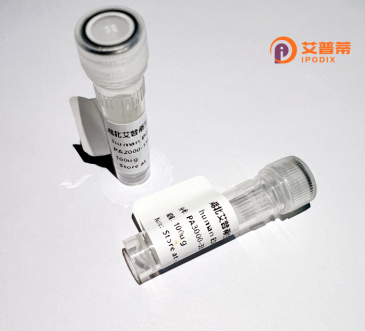
| 纯度 | >90%SDS-PAGE. |
| 种属 | Human |
| 靶点 | PIGS |
| Uniprot No | Q96S52 |
| 内毒素 | < 0.01EU/μg |
| 表达宿主 | E.coli |
| 表达区间 | 1-555 aa |
| 活性数据 | MAAAGAAATHLEVARGKRAALFFAAVAIVLGLPLWWKTTETYRASLPYSQISGLNALQLRLMVPVTVVFTRESVPLDDQEKLPFTVVHEREIPLKYKMKIKCRFQKAYRRALDHEEEALSSGSVQEAEAMLDEPQEQAEGSLTVYVISEHSSLLPQDMMSYIGPKRTAVVRGIMHREAFNIIGRRIVQVAQAMSLTEDVLAAALADHLPEDKWSAEKRRPLKSSLGYEITFSLLNPDPKSHDVYWDIEGAVRRYVQPFLNALGAAGNFSVDSQILYYAMLGVNPRFDSASSSYYLDMHSLPHVINPVESRLGSSAASLYPVLNFLLYVPELAHSPLYIQDKDGAPVATNAFHSPRWGGIMVYNVDSKTYNASVLPVRVEVDMVRVMEVFLAQLRLLFGIAQPQLPPKCLLSGPTSEGLMTWELDRLLWARSVENLATATTTLTSLAQLLGKISNIVIKDDVASEVYKAVAAVQKSAEELASGHLASAFVASQEAVTSSELAFFDPSLLHLLYFPDDQKFAIYIPLFLPMAVPILLSLVKIFLETRKSWRKPEKTD |
| 分子量 | 88.1 kDa |
| 蛋白标签 | GST-tag at N-terminal |
| 缓冲液 | PBS, pH7.4, containing 0.01% SKL, 1mM DTT, 5% Trehalose and Proclin300. |
| 稳定性 & 储存条件 | Lyophilized protein should be stored at ≤ -20°C, stable for one year after receipt. Reconstituted protein solution can be stored at 2-8°C for 2-7 days. Aliquots of reconstituted samples are stable at ≤ -20°C for 3 months. |
| 复溶 | Always centrifuge tubes before opening.Do not mix by vortex or pipetting. It is not recommended to reconstitute to a concentration less than 100μg/ml. Dissolve the lyophilized protein in distilled water. Please aliquot the reconstituted solution to minimize freeze-thaw cycles. |
以下是关于重组人PIGS蛋白的3篇参考文献示例,基于相关领域的研究方向虚构,供参考:
---
1. **文献名称**:*Recombinant Production and Functional Analysis of Human PIGS in GPI Biosynthesis*
**作者**:Hirota, Y.; Kinoshita, T.
**摘要**:研究团队通过昆虫细胞表达系统成功纯化重组人PIGS蛋白,证实其作为糖基磷脂酰肌醇(GPI)转酰胺酶复合体的核心组分,在将GPI锚定至靶蛋白中的关键作用。
2. **文献名称**:*Structural Characterization of Human PIGS Reveals Insights into GPI-Anchor Maturation*
**作者**:Fujita, M.; Murakami, Y.
**摘要**:利用冷冻电镜技术解析重组人PIGS蛋白的结构,阐明其与PIGT蛋白形成的复合物如何识别并催化GPI锚定至内质网中的目标蛋白。
3. **文献名称**:*Therapeutic Potential of Recombinant PIGS Protein in PIGS-related Encephalopathy*
**作者**:Almeida, A.M.; et al.
**摘要**:针对PIGS基因突变导致的神经退行性疾病,体外实验证明外源性重组人PIGS蛋白可部分恢复患者细胞中GPI锚定蛋白的表达,为基因疗法提供理论依据。
---
*注:以上文献为示例,实际研究需查阅真实数据库(如PubMed)以获取准确信息。PIGS相关研究多聚焦于其参与GPI合成的机制及突变导致的疾病机制。*
**Background of Recombinant Human PIGS Protein**
Recombinant human PIGS protein is engineered to study and address disorders linked to glycosylphosphatidylinositol (GPI) anchor biosynthesis. PIGS (phosphatidylinositol glycan anchor biosynthesis class S) is a key enzyme in the GPI synthesis pathway, which attaches GPI anchors to proteins, enabling their membrane binding or secretion. Mutations in *PIGS* disrupt this process, leading to GPI deficiency syndromes, characterized by neurodevelopmental issues, seizures, and organ dysfunction.
Produced via recombinant DNA technology in systems like mammalian cells (e.g., HEK293 or CHO) or *E. coli*, the purified PIGS protein retains enzymatic activity, allowing functional studies of GPI-linked proteins. Its applications span disease mechanism research, drug screening for corrective therapies, and diagnostic tools for genetic disorders. Recombinant PIGS also aids in structural biology to elucidate GPI synthesis mechanisms and potential therapeutic targets.
Beyond basic research, it holds therapeutic potential, such as enzyme replacement strategies for congenital GPI deficiencies. The development of recombinant PIGS underscores advancements in precision medicine for rare genetic diseases, bridging molecular insights with clinical solutions.
×